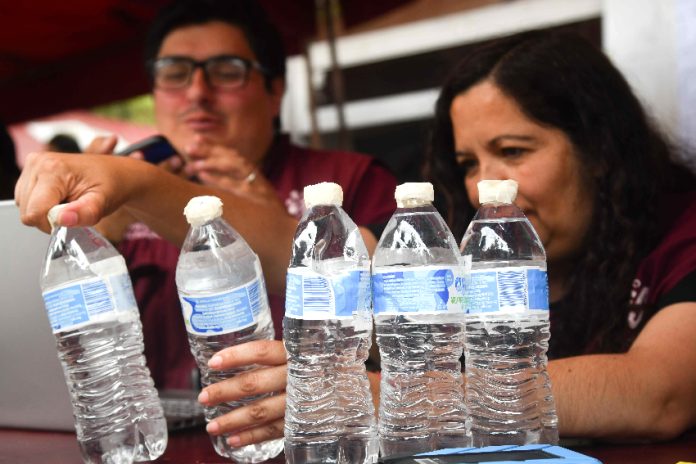Residents suspected gasoline. Mexico City officials say that industrial oils and lubricants are to blame. But President Andrés Manuel López Obrador (AMLO) affirmed on Thursday that the substance that contaminated the water supply in the Benito Juárez borough of the capital is not yet known.
How the contaminant got into the water supply in the first place is still a mystery as well.
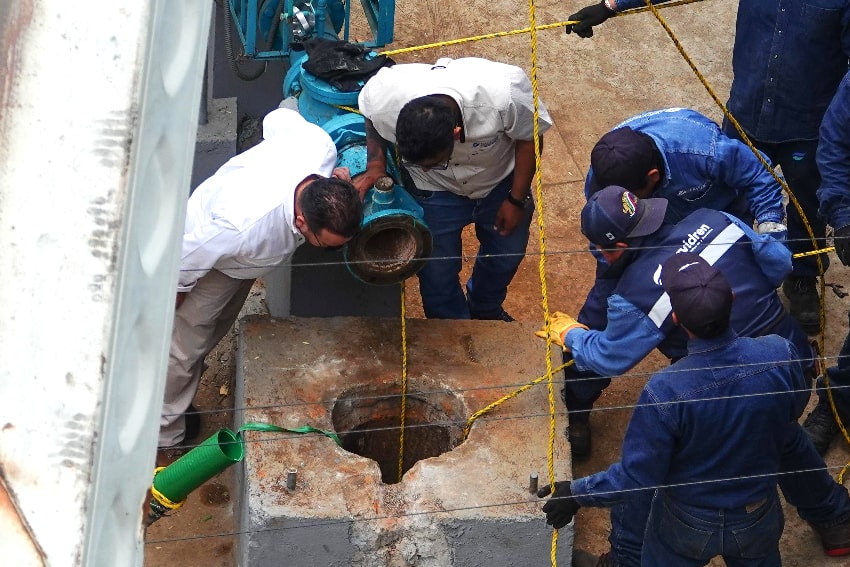
Residents of several Benito Juárez neighborhoods began complaining of foul-smelling water in late March. Mexico City Mayor Marti Batrés confirmed on Monday that the water supply had been contaminated, and on Tuesday night the National Guard closed off a well in the neighboring borough of Álvaro Obregón that was identified as the source of the contamination.
At López Obrador’s morning press conference on Thursday, a reporter noted that there has been speculation that the theft of fuel from pipelines — a common crime in Mexico — could have caused the contamination.
AMLO responded that an investigation is underway, noting that both the Mexico City government and the state oil company Pemex are seeking to identify the cause. He said that “chemical substances” had been detected in the well that was closed off, but added that “it is not yet known” what they are.
“I believe that today there will be more clarity about what is causing the contamination of this well, which, of course, was closed,” López Obrador said.
Mayor Batres spoke about the water problem later on Thursday but didn’t say that the cause of the contamination had been determined. He previously ruled out the possibility that gasoline contaminated the water supply.
“Analyses carried out to date rule out the presence of gasoline,” he said Tuesday, adding that no explosion risk had been detected.
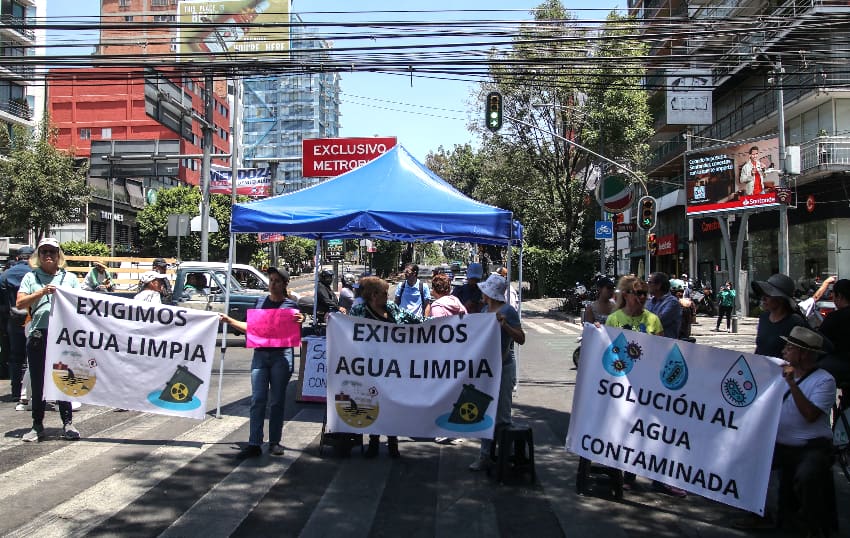
Mexico City Risk Management and Civil Protection Minister Myriam Urzúa reiterated Thursday that a “lubricant or oil” caused the contamination and said that the government will receive lab results identifying the substance next week.
“We have absolute certainty that it isn’t gasoline,” she said.
López Obrador told reporters that Pemex pipelines near the contaminated well were being checked for leaks, but noted that “nothing” had been found so far.
“That doesn’t mean that the possibility of there being a leak has been ruled out,” he said before noting that earthquakes in the area — recent “microquakes” have affected Álvaro Obregón — could have ruptured pipelines. AMLO also acknowledged that a pipeline tap by thieves could be the cause.
Asked about the possibility of sabotage, he responded:
“There are those who say that there could have been the intention to throw fuel in the well. There is no evidence for that.”
López Obrador also said that the most important thing is to protect the safety of citizens and ensure that there is no risk of an explosion and a resultant “tragedy.” Fuel pipeline taps have caused a number of fatal explosions in Mexico, including one in Hidalgo in 2019 that claimed 137 lives.
Mayor defends Mexico City government’s response
Mayor Batres said on the X social media platform on Thursday that the Mexico City government responded promptly to the “water problem” in the northwestern part of Benito Juárez.
The city government has been criticized for an allegedly slow response to the situation, but Batres wrote that authorities have been “helping” in a range of ways since the problem was first reported. He said they have assessed the risk of an explosion with combustible gas detectors, carried out “health visits,” supplied free drinking water to affected residents and conducted safety “verifications of establishments.”
Meanwhile, the local governments in Benito Juárez and Álvaro Obregón have done “nothing” to help the Mexico City government, said Batres, who represents the Morena party. The local authorities — headed by opposition-party mayors — have instead focused on political point-scoring, he said.
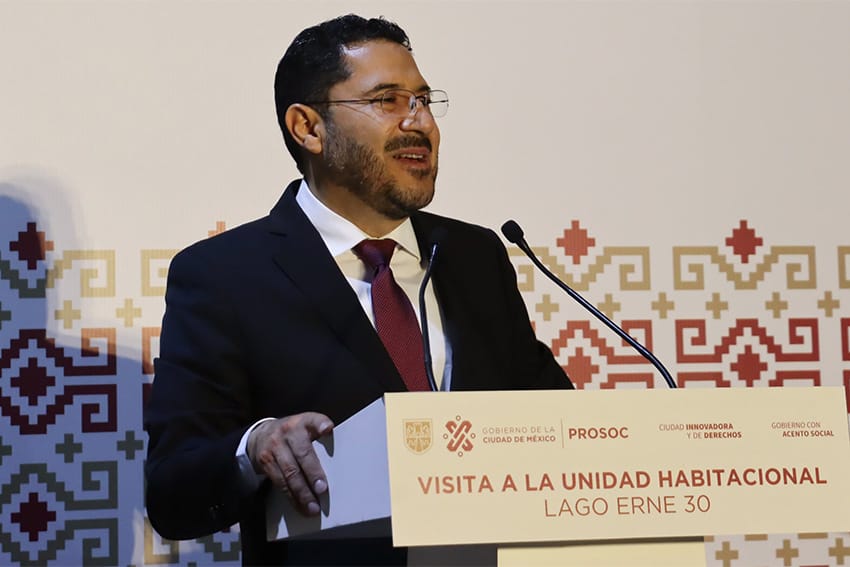
Benito Juárez residents continue to protest
Residents affected by the contamination set up a blockade on Insurgentes Avenue — Mexico City’s longest road — for a third consecutive day on Thursday. Their protest affected traffic, including Metrobús services, along a section of Insurgentes Sur, as the southern end of the avenue is known.
The Sin Embargo news website reported that protesters — who have demanded to meet with the Mexico City water chief — shouted, “We want a solution” and “We want clean water.”
Some residents turned up to the protest with samples of the contaminated water in bottles. The water was brown and smelled of gasoline or insecticide, Sin Embargo said.
Mexico City residents generally don’t drink tap water, but they do, of course, bathe in it and use it to wash dishes and clothes. Some Benito Juárez residents have reported skin and eye problems due to contact with the contaminated water.
Civil protection minister: contamination will continue for another two weeks
Urzúa said in a radio interview on Thursday that residents in affected Benito Juárez neighborhoods, including Del Valle, Nápoles and Nochebuena can expect to have contaminated water coming out of their faucets for another two weeks — even though the apparent source of the contamination has been closed off.
“An obvious recommendation is to drink water from another source,” she said.
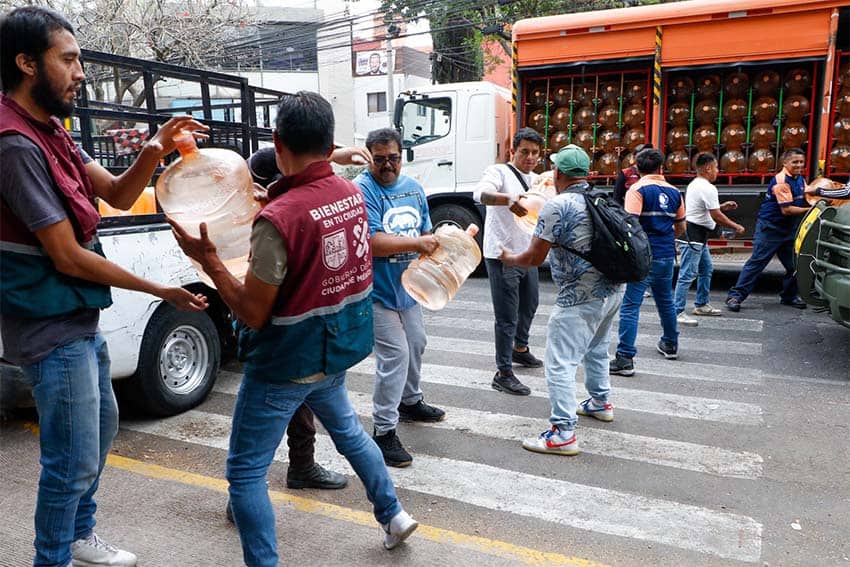
Urzúa said that the “intensity” of the contamination will decrease over time because contaminated water is no longer entering the water system.
She also said that the government has sufficient garrafones — 20-liter bottles of water — to hand out to all residents who ask for them. Some residents picked up bottles at the San Lorenzo park in Del Valle on Thursday.
The contamination of the water supply in Benito Juárez adds to Mexico City’s water problems. Water scarcity is a major concern in the capital, and supply is already unreliable or nonexistent in some parts of the city.
Benito Juárez, however, has generally had a dependable supply of water — that didn’t reek of gasoline until, suddenly, in late March, it did.
With reports from Sin Embargo, Aristegui Noticias, El Financiero, Dinero en Imágen and Excélsior
